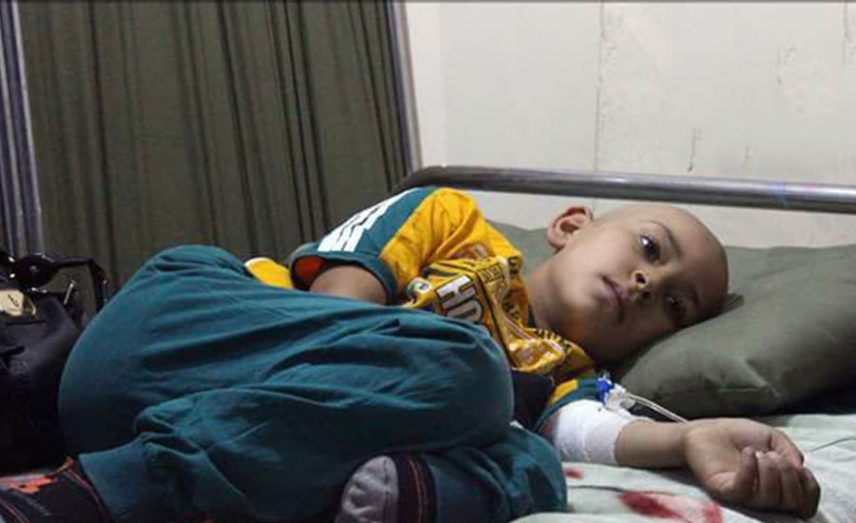Ten-year-old Noura, who does not know the truth about the disease which she has suffered from for five years, notices the pallor of her face and her hair falling out, and she notices the increasing pain because of the lack of medicine after Assad regime forces took control of the eastern Damascus districts. Noura and others suffering from cancer can do nothing but wait for regime forces to allow the entry of medicine — or to allow them to leave the Ghouta.
Amid these difficulties, Noura and other cancer patients depend on services offered by the Dar al-Rahma medical center to treat blood and oncology diseases, the sole facility to offer the service in the Eastern Ghouta.
The center was founded in mid-2013 and tries with all available means to offer its medical services for free to cancer patients in the district, including analyses and chemotherapy, as well as surgery and follow-up treatment.
The center reached a cure rate of 37 percent of patients as of the end of 2016, but that dropped to 31 percent in 2017 due to the increasing crisis of the siege and the prevention of medicines entering the area.
The tightening of the regime’s siege and the blocking of medicine, which had been entering the Ghouta through tunnels, has contributed to the increase in incidents of death, rising to 20 fatalities in the three last months of 2017, mostly children. A total of 103 people from the total number of patients died from the period spanning 2013 to the end of 2016.
The number of cancer patients, according to the center’s statistics, is about 1,200, which includes 20 percent children, 57 percent women and 23 percent men. About 559 are currently receiving treatment for center, while 20 patients have died as a result of the lack of medicine, in addition to 40 cases of relapse.
“The 559 patients are at risk of death due to the lack of medicine. The doses in the center are nearly out, and there are only about 3 percent of the patients’ needs available,” the director of the medical center, Dr. Wissam Mohamad said. The center is currently working to distribute doses to the largest possible number of patients, in addition to providing painkillers.
At the end of 2017, the United Nations entered the Eastern Ghouta with three humanitarian convoys, which included some medicine and painkillers. However, there was no medicine specifically for cancer patients despite the number in need of treatment.
Noura’s mother discusses her daughter’s suffering, saying: “My daughter was crying a great deal when she looked in the mirror and found her hair falling out. I convinced her to put on a hijab because she’d gotten older.” She adds: “The pain is increasing in my daughter’s body, and there is no medicine to reduce it.”
Despite specialist medical teams being present in the Eastern Ghouta, there are some cases which cannot be treated and must be evacuated to outside the Ghouta. Some types of patients require comprehensive treatment, which is not available in the Ghouta, while others need advanced radiation therapy, which is not even available in the capital Damascus, and thus patients must travel to European countries to receive treatment.
There are also cases that require surgery and follow-up treatment to deal with the complications arising from operations and chemotherapy. This requires specialized centers and large amounts of medicine, as patients must continue to receive the medicine. Any cutoff of medicine could lead to a relapse, and thus, in these cases, they must be treated outside the Ghouta.
According to Dar al-Rahma’s director, the center is able to treat a large number of patients if there is sufficient medicine, adding that the number of patients who require urgent evacuation is 50.
This article was translated and edited by The Syrian Observer. Responsibility for the information and views set out in this article lies entirely with the author.


